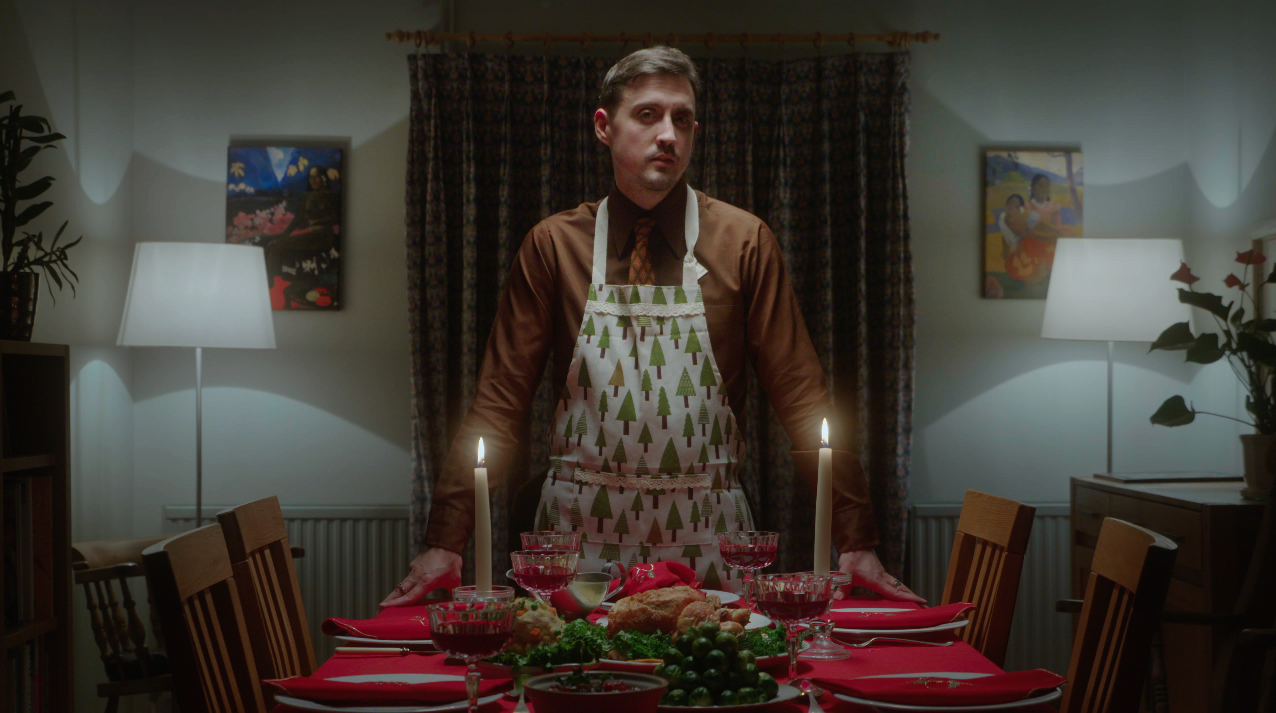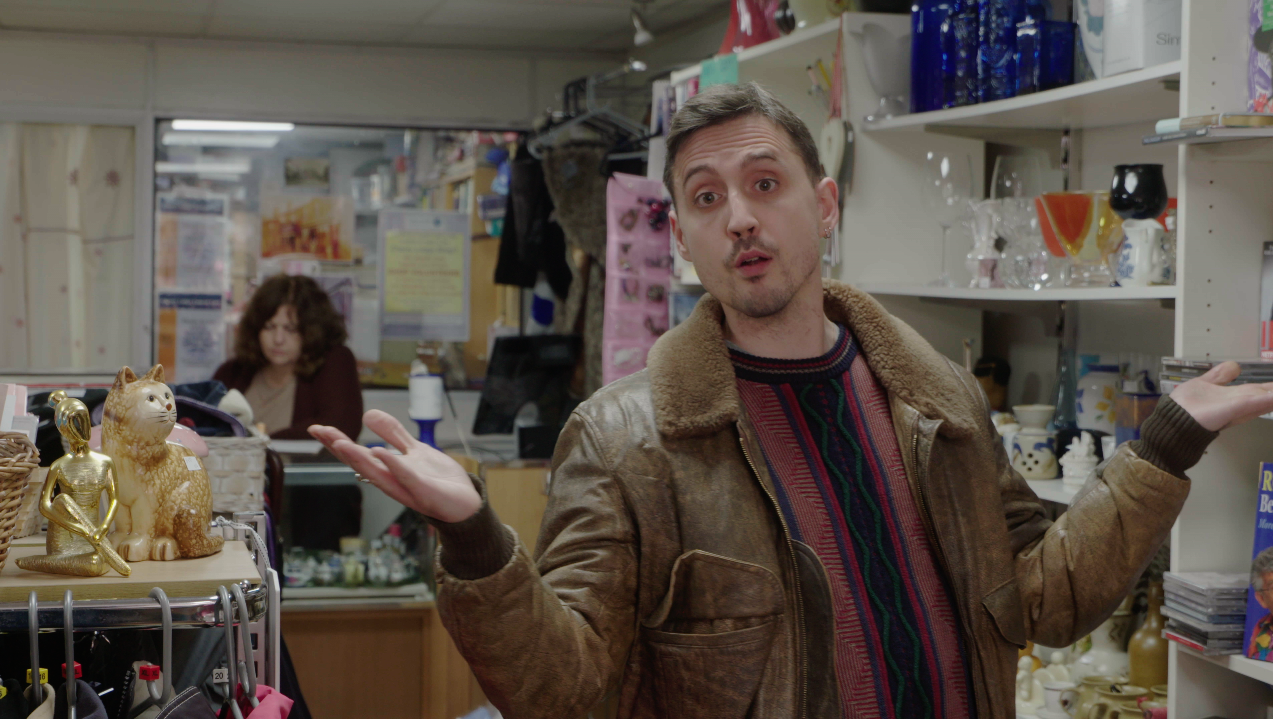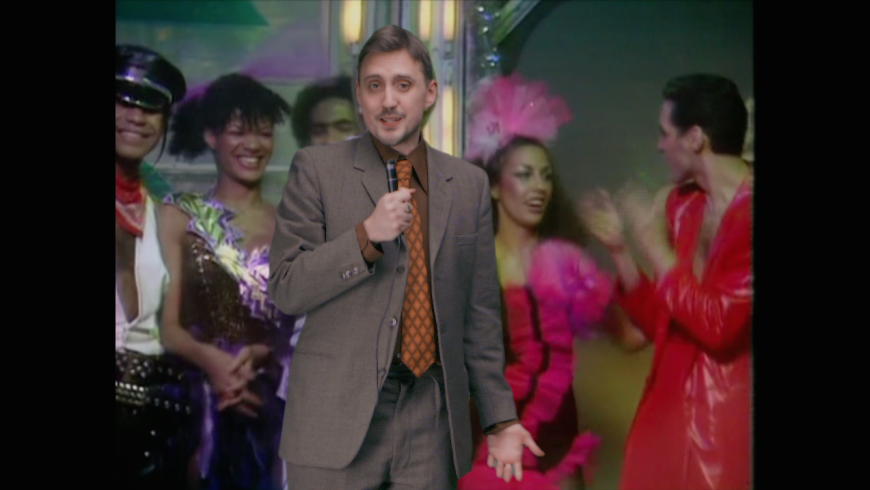Guy Oliver
Louise Ashcroft
Artist and performer Louise Ashcroft ponders the conflicting voices in her head as she watches Guy Oliver's You Know Nothing of My Work.
Projects
I catch the Eurostar to Amsterdam right after watching the film for the first time; still humming its earworms, still haunted by the questions it poses. My partner almost misses the train because she HAS TO buy Frazzles, and the Eurostar attendant warns me that I should call my boyfriend to hurry him up, so I call my girlfriend and she skims through passport control just in time. The people sat opposite us are drunk young professionals discussing a colleague who they think is gay because he wears a lot of pink, and another who worries that his daughter is a ‘rugby lesbian’ and therefore he’ll never be able to walk her down the aisle. Watching Guy’s film has made me even more hyper-aware of the gender prejudices that were around me all along. Some fellow travellers are talking loudly about a friend whose sister co-presents a TV show about Formula One, and how her female co-presenter is paid three times as much because she has slept her way to the top. As they slate this woman, I wonder why the men she may (or may not) have slept with are let off the hook, and why slut-shaming takes precedence over calling out gender inequality and sexual exploitation. When I’d first watched Guy’s film, I’d sided with its female protagonist, Rebecca Lucy Taylor (aka Self Esteem) who asks why it’s necessary that we lament or redeem the artworks of sex offenders. And why a straight white ‘Guy’ is the hero commissioned to do so. Why am I wasting more time thinking and writing about these monstrous males when I could spend that time platforming the millions of exceptional artists that the patriarchal canon has been too narrow for?
We arrive at the Amsterdam hotel. There are books in the room, I flick through a Jo Brand novel about a young woman who humorously (but sensitively) tackles issues like post-natal depression, and I try to forget Guy’s monsters. A few pages in, however, it becomes apparent that the novel’s main character, Alice, is in love with Morrissey. Maybe Guy has a point – we can’t escape the legacy of these men, so even if we’d rather be watching Desiree Akhavan, Michaela Coel or Julia Davis, we have to ask ourselves what must be done with the work of the likes of Woody Allen, whose autobiography has just been pulped by publishers less fanatical than Guy.
The next day, we walk through Amsterdam’s red-light district. It’s 10am on a weekday and the windows are densely populated with cosmetically enhanced women in minimalist Lycra. Should I be horrified, or should I be cheering them on? A sign on a wipe-down plastic picnic-chair reads ‘respect our sex workers, they keep your women safe and your men happy’. Something about this chalkboard typeface slogan makes me retch… the idea that these women have to ‘take one for the team’ as a personified vent for the lads’ uncontrollable sexual needs. I’m trying to take the day off, but my mind keeps returning to Guy’s feminist nemesis who says ‘I agree that the subject matter is interesting but do we really need it, and if so, should you be the one commenting?’ …
(SPOILER ALERT).
Conflicting voices in my head try to answer her question.
Me 1: I think you’re supposed to say ‘spoiler alert’ before you reveal an important plot twist! That’s how consent works.
Me 2: Guy’s aside, after she calls him out, is the old line that he didn’t want to compare himself to Jesus, but he felt crucified… But he certainly doesn’t proclaim to be enlightened or expect anyone to follow him. Quite the opposite. Throughout the film he actively erases his own authority and eschews traditional masculinity by singing all his lines discordantly like an X-factor-Mary-Poppins-reject and wearing that hideous multicoloured jumper that looks like something he picked up in a charity shop.
Me 1: Perhaps the very same charity shop where he begins the film? And where he might be lulling us into thinking he’s a lovely wholesome boy who’s buying his Nan a birthday gift and has heeded Greta’s message that preloved M&S is best.
Me 2: Are you saying you think the charity shop scene is virtue-signalling?
Me 1: A little bit. I mean, how can you be angry at a charity shop? It’s the perfect armour to get us on his side from the start.
Me 2: Does he have one side? And, isn’t the charity shop just a useful foil; an embodiment of the innocence that nostalgia attributes to the past… so that when Rolf Harris and Lost Prophets show up there we’re shocked because it seems incongruous?
Me 1: No! Rolf Harris, Bill Cosby, Jimmy Savile and Woody Allen ARE aesthetically at home there, that’s the real shock. These loveable beta-males have always eschewed traditional macho roles too. It’s the sweet charitable ones that are most likely to be monsters… eccentric man-children like Rolf Harris, wobbling and panting the lines of a ditty about their extra leg.
Me 2: …Yes, the snuggly, socially awkward ones with the Dad-bods.
Me 1: And that’s exactly what these guys are to Guy, his art Dads; his cultural fathers; the lineage to which his practice is heir. In the film he’s trying to reconcile his rootlessness in the aftermath of their betrayal. It’s a personal act of catharsis, openly offered up to us all.
Me 2: And in the very final scene, Guy himself is the father, ominously lit and waiting to serve Sunday roast to a family which is absent – surrounded by empty seats – as though the women and children have scarpered (perhaps to form a free-love, lesbian eco-commune, where everyone is equal and works together to care for kids and grow their own food, and love each other, and the England Women’s Football Team are… sorry got distracted…what were we talking about again…?)

Me 1: Isn’t that exactly what we should be focussing on, though? – Alternatives. We need to change how art is made, who it’s made by and who sees it, instead of wasting more of our limited life hours on the few criminal men who got to be part of the canon.
Me 2: Canon is a phallic term.
Me 1: Yes, it is. And the cute girl in the audience (Guy calls her that, not me!) is right when she asks whether Guy had to access any trauma to make this film, or whether others’ trauma is just edgy subject matter for his art which hides behind ambiguity to make it seem important, and uses self-deprecation to protect itself from critique. ‘I suppose that’s art and I am used to men making me feel like I don’t understand art,’ she says.
Me 2: Yes! Her statement re-orientates the critique towards art itself, and our collective complicity in letting such a narrow range of expression by such a narrow range of people dominate our popular culture.
Me 1: Do you think that Guy’s brave for playing out all these problematic aspects of his journey as honestly as he does? For scripting and casting himself as the mansplaining fool and the father figure brandishing a carving knife as he brings things to an inconclusive conclusion.
Me 2: Yes, I think he’s a fucking hero and deserves a medal! Just kidding. When I hear the word ‘problematic’, I imagine someone building an attic on top of a problem, so they can hide there and avoid trying to solve the problem.
Me 1: Exactly, and at least Guy isn’t hiding. He’d rather wriggle through many different opposing positions and archetypes than avoid the risk of hypocrisy, which is why it’s an honest, unhypocritical work.
Me 2 : But isn’t this wriggling part of the deception – like a politician who won’t give a straight answer. Why not be more direct, like the YouTuber T1J who skypes Guy in the film and explains very clearly when he thinks it’s OK to separate art and life and when it’s not - using the example of Louis CK joking about his own toxic masculinity but still perpetrating it.
Me 1: T1J, is that his real name? Did his Mum give birth in the taxi and name him after the registration plate?
Me 2: Perhaps. And that’s why he gets from A to B so quickly in his argument, which to me highlights that sexual abuse is interconnected with other forms of oppression, such as racism and classism. T1J says that the Cosby show is still important to him, and this might be because it was one of the first black-led sitcoms he saw on mainstream TV growing up. Intersectionality creates unique modes of discrimination and Guy is higher up the privilege-beanstalk than T1J. Does that disqualify Guy from the right to comment?
Me 1: I’m not sure. As the inner voices of a middle-class white woman we’re also near the top of that privilege beanstalk, so why should we comment? The rich, white, heteronormativity of the Hollywood #MeToo movement is one of the reasons I’m cynical about art and fashion that uses sexual violence as subject matter but seldom gets beyond the capitalist pursuit of personal branding. This reproduces violence. Black Civil Rights Activist Tarana Burke founded the #MeToo movement in The Bronx in 2006, but it only went viral after the Goop brigade started appropriating it.
Me 2: But Guy’s work is hardly a feminist slogan T-shirt made in an Indonesian sweatshop for a rich white feminist to flaunt on Instagram. His film is full of guilt and self-directed suspicion, and I don’t think those feelings are just there as a self-indulgent plea for acceptance and forgiveness; they’re also a challenge to his/our actions and beliefs. Artists often do unethical things for ‘research’, but Guy buying a Lost Prophets CD at Oxfam isn’t exactly a Santiago Sierra move is it?
Me 1: It’s the principle though, and I do think the film is self-indulgent male guilt catharsis, but it doesn’t make it unnecessary. The collective guilt that Guy is channelling could be an effective memorial to those who have suffered, because guilt lives inside of us and makes us feel uncomfortable every day, unpicking the scabs so there’s no illusion abuse can’t happen again.
Me 2: The emotion of guilt acts as a sort of living monument? But it’s all a big joke to Guy though, right?
Me 1: In Freud’s view, jokes are the venting of views and thoughts that society usually oppresses and forbids.
The reason that Guy’s creative villains got away with what they did for so long was because people were scared to talk about it. Surely radical transparency is the antidote to that, which is why jokes might be a tool to speak the truth, so we might address it honestly. Jokes also add a spoonful of sugar to help the medicine go down (with Guy as our Mary Poppins) which helps people let their guard down and be less defensive.
Me 2: Gotta love Poppins, but Freud was a dick-obsessed misogynist who believed that ‘Women oppose change, receive passively, and add nothing of their own’ because they’re so envious of men’s penises.
Me 1: What did Sigmund Freud say when he had an epiphany?...Urethra!!
Me 2: Was that supposed to be a joke?
We flee the red-light district in search of some quality Gouda, dodging a spicy one marketed as ‘Cheese for Men’. It’s the weekend of International Women’s Day, I have period pain… thanks biblical Eve for being a greedy, selfish, Cox-fixated (orange pippin) bitch! This International Women’s Day, like every year, the comedian Richard Herring is doing a sponsored Twitter challenge in aid of women’s charities by personally replying to every man who asks ‘when is International Men’s Day?’ the way people ask ‘When is Straight Pride?’. His stunt aims to highlight patriarchal ignorance and draw attention to the fact that one woman in four will experience domestic violence at some point in her lifetime and two women are killed each week in England and Wales by a current or former partner. Some people think Herring is just drawing attention to himself, however, and I am still wondering if that’s what Guy is doing too – trying to look woke by hijacking #MeToo so he can get his film funded and seem relevant. A female Twitterer is @ing Richard Herring to say ‘today is not about you’, but whatever you think about guys like Guy trying to clumsily do the right thing, I do believe they’re making a meaningful effort to ask difficult questions and face inevitable backlash. Shouldn’t we be supporting that? You’ll need to watch Guy’s film for yourselves, and piece together your own conclusions, from the collusions and collisions that he Glee-fully guides us through.
Patriarchy oppresses men too you know, the poor little sausages!
–––
Louise Ashcroft is an artist whose performances and videos chronicle her playfully antagonistic disruptions of economic and social realities. She runs the performance night Unperforming and is co-founder of the free, alternative art school AltMFA. Louise teaches at Goldsmiths, University of London and at UCA, Farnham.
Guy Oliver's You Know Nothing of My Work (2020) is commissioned as part of the Jerwood/FVU Awards 2020: Hindsight, a collaboration between Jerwood Arts and Film and Video Umbrella.



